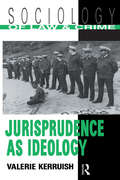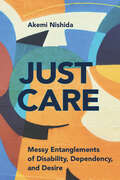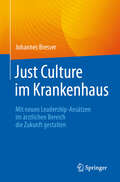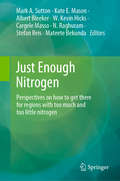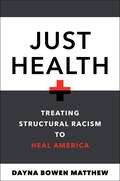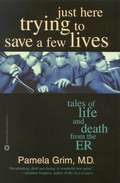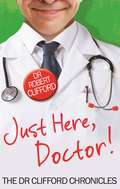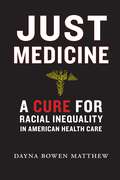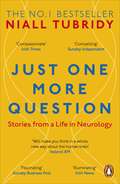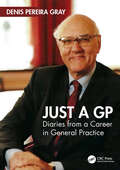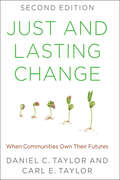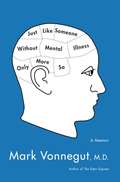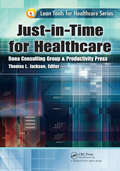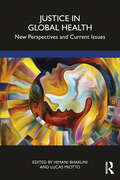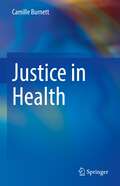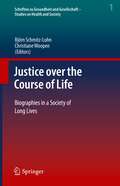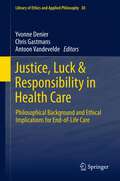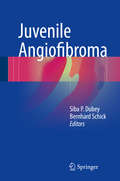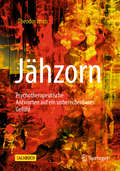- Table View
- List View
Jurisprudence as Ideology (Sociology of Law and Crime)
by Valerie KerruishIn Jurisprudence as Ideology, Valerie Kerruish asks how it is that people who are put down, let down and kept down by law can be thought to have a general political obligation to obey it. She engages with contemporary issues in socialist, feminist and critical legal theory, and links these issues to debates in jurisprudence and the philosophy and sociology of law.
Just Care: Messy Entanglements of Disability, Dependency, and Desire (D/C: Dis/color)
by Akemi NishidaJust Care is Akemi Nishida’s thoughtful examination of care injustice and social justice enabled through care. The current neoliberal political economy has turned care into a business opportunity for the healthcare industrial complex and a mechanism of social oppression and control. Nishida analyzes the challenges people negotiate whether they are situated as caregivers, receivers, or both. Also illuminated is how people with disabilities come together to assemble community care collectives and bed activism (resistance and visions emerging from the space of bed) to reimagine care as a key element for social change. The structure of care, Nishida writes, is deeply embedded in and embodies the cruel social order—based on disability, race, gender, migration status, and wealth—that determines who survives or deteriorates. Simultaneously, many marginalized communities treat care as the foundation of activism. Using interviews, focus groups, and participant observation with care workers and people with disabilities, Just Care looks into lives unfolding in the assemblage of Medicaid long-term care programs, community-based care collectives, and bed activism. Just Care identifies what care does, and asks: Are some people’s needs more sacred and urgent than others?
Just Culture im Krankenhaus: Mit neuen Leadership-Ansätzen im ärztlichen Bereich die Zukunft gestalten
by Johannes BresserIn den letzten Jahrzehnten gab es im medizinischen Sektor beeindruckende Fortschritte, doch die Förderung einer fortschrittlichen Organisationskultur, entscheidend für Teamkooperation, wurde vernachlässigt. Diese Vernachlässigung belastet nicht nur das Personal, sondern beeinträchtigt auch die Patientenversorgung und die wirtschaftliche Gesundheit von Krankenhäusern. Vertrauensvolle Teamarbeit im Krankenhaus ist von großer Bedeutung. Die Just Culture, bereits in der Luftfahrt erfolgreich implementiert, ist ein wegweisender Ansatz. Sie betont einen lernorientierten Umgang mit Fehlern, gerechte Behandlung der Mitarbeitenden sowie Vertrauen und psychologische Sicherheit. Zusammen mit technischen Ressourcen verbessert sie die Patientenversorgung erheblich. Bisher fehlte eine umfassende Darstellung von Just Culture und ihren Auswirkungen im Krankenhaus. Dieses Werk bietet erstmals Einblicke in Grundprinzipien, positive Effekte, Forschungsergebnisse, Fallbeispiele und ein innovatives Veränderungskonzept. Es richtet sich an Führungskräfte, leitendes Personal und alle, die an Kulturtransformation interessiert sind. Neue Leadership-Ansätze im medizinischen Bereich sind entscheidend für die positive Entwicklung der Organisationskultur. In einer Zeit zunehmender Komplexität wird Just Culture angesichts des Fachkräftemangels zu einem kritischen Wettbewerbsvorteil und Schlüssel für nachhaltigen Erfolg.
Just Enough Nitrogen: Perspectives on how to get there for regions with too much and too little nitrogen
by Mark A. Sutton Albert Bleeker Stefan Reis Kate E. Mason W. Kevin Hicks Cargele Masso N. Raghuram Mateete BekundaThis volume provides a unique collection of contributions addressing both the ‘too much’ and ‘too little’ sides of the nitrogen story. Building on analyses started at the 6th International Nitrogen Conference, Kampala, the book explores the idea of ‘just enough nitrogen’: sufficient for sustainable food production, but not so much as to lead to unsustainable pollution and climate problems. The range of nitrogen threats examined, solutions evaluated and science-policy analyses presented here has provided the foundation to agree the ‘Kampala Statement-for-Action on Nitrogen in Africa and Globally,’ as reported in this volume. Humanity today faces unprecedented challenges: How to feed a growing population? How to reduce air pollution, water pollution and climate change? How to handle regional differences in an era of increasing globalization? These questions are at the heart of this edited volume which examines the multi-dimensional nature of the global nitrogen challenge. While humans have massively altered the nitrogen cycle, the consequences have become polarized. Some regions have too much nitrogen, associated with pollution and wasteful use of a valuable resource, while other regions have too little nitrogen, leading to constraints on food production and depletion of soil nutrient stocks. The volume provides a unique collection of contributions addressing both the ‘too much’ and ‘too little’ sides of the nitrogen story. Building on analyses started at the 6th International Nitrogen Conference, Kampala, the book explores the idea of ‘just enough nitrogen’: sufficient for sustainable food production, but not so much as to lead to unsustainable pollution and climate problems. The range of nitrogen threats examined, solutions evaluated and science-policy analyses presented here has provided the foundation to agree the ‘Kampala Statement-for-Action on Nitrogen in Africa and Globally,’ as reported in this volume. Together, the contributions in this book are now informing actions by the International Nitrogen Initiative (INI) in working with the United Nations Environment Programme and others to establish the International Nitrogen Management System (INMS). A key outcome has been to catalyse development of the first Resolution on Sustainable Nitrogen Management, as adopted by the fourth UN Environment Assembly (UNEA/EA.4/Res.14).The work is written for researchers and policy makers and all those interested in seeing how sustainable nitrogen management can contribute to meeting many of the UN Sustainable Development Goals.
Just Health: Treating Structural Racism to Heal America
by Dayna Bowen MatthewChoice Outstanding Academic Title 2023The author of the bestselling Just Medicine reveals how racial inequality undermines public health and how we can change itWith the rise of the Movement for Black Lives and the feverish calls for Medicare for All, the public spotlight on racial inequality and access to healthcare has never been brighter. The rise of COVID-19 and its disproportionate effects on people of color has especially made clear how the color of one’s skin is directly related to the quality of care (or lack thereof) a person receives, and the disastrous health outcomes Americans suffer as a result of racism and an unjust healthcare system.Timely and accessible, Just Health examines how deep structural racism embedded in the fabric of American society leads to worse health outcomes and lower life expectancy for people of color. By presenting evidence of discrimination in housing, education, employment, and the criminal justice system, Dayna Bowen Matthew shows how racial inequality pervades American society and the multitude of ways that this undermines the health of minority populations. The author provides a clear path forward for overcoming these massive barriers to health and ensuring that everyone has an equal opportunity to be healthy. She encourages health providers to take a leading role in the fight to dismantle the structural inequities their patients face. A compelling and essential read, Just Health helps us to understand how racial inequality damages the health of our minority communities and explains what we can do to fight back.
Just Here Trying to Save a Few Lives: Tales of Life and Death From the ER
by Pamela GrimAn account that will profoundly move you and, like Oliver Sacks's An Anthropologist on Mars, forever change the way you look at medicine, Just Here Trying to Save a Few Lives introduces a passionate, eloquent new voice. Author and emergency room physician Pamela Grim not only takes you into her dramatic life-and-death world but, in unforgettable prose, shows us the almost unbearable decisions and the heartbreaking conflicts of a woman who just might someday save your life.Here is life on the front lines of medicine, from modern, well-stocked American ERs to third-world clinics devoid of even the most basic equipment. Here a newborn fights for his life, a would-be suicide arrives with a dozen prescription bottles, a teenager lies bleeding with gunshot wounds to the chest, a hundred needy children wait for treatment in a makeshift hospital in Bosnia, and a thousand more people, desperate and dying, hope for some relief in sub-Sahara Africa. Here sleep-deprived doctors perform heroic procedures only to see patients die ... yet they still manage to pull off miracles. As she opens the doors to this adrenaline-fueled environment, Dr. Grim also bares her soul and describes her own personal journey ... including her struggle with burnout and the crisis of faith that drove her to practice medicine in countries ravaged by infectious diseases, poverty, and war.More relentlessly compelling than any medical thriller, Just Here Trying to Save a few Lives has the power to leave you richer. It will lead you to appreciate the resilience of the human body and human spirit as never before, and will make you forever grateful that there are doctors like Pamela Grim. More relentlessly compelling than any medical thriller, Just Here Trying to Save a few Lives has the power to leave you richer. It will lead you to appreciate the resilience of the human body and human spirit as never before, and will make you forever grateful that there are doctors like Pamela Grim.
Just Here, Doctor
by Robert CliffordJust Here, Doctor is the true story of a young country doctor and his patients - a richly entertaining and humorous chronicle of the life of a small West Country community as seen through the eyes of its G.P. Dr Clifford has some marvellous stories to tell: about the home delivery of a cricket fan's baby - in between overs of a televised Test Match; of the time he rode off on a gigantic horse to attend a hunting casualty - and rode back in an ambulance as the casualty; and the amazing saga of his student rugby tour of France - the craziest, most drunken ever undertaken. Here too, on the more serious side, are moving accounts of the courage of ordinary people in the face of serious, even fatal illness. Teeming with colourful and curious places and characters, Just Here, Doctor is packed with comedy, drama and tragedy, every bit as warm and enthralling as James Herriot's famous stories of a vet's life.
Just Here, Doctor (The Dr Clifford Chronicles)
by Dr Robert CliffordJust Here, Doctor is the true story of a young country doctor and his patients - a richly entertaining and humorous chronicle of the life of a small West Country community as seen through the eyes of its G.P. Dr Clifford has some marvellous stories to tell: about the home delivery of a cricket fan's baby - in between overs of a televised Test Match; of the time he rode off on a gigantic horse to attend a hunting casualty - and rode back in an ambulance as the casualty; and the amazing saga of his student rugby tour of France - the craziest, most drunken ever undertaken. Here too, on the more serious side, are moving accounts of the courage of ordinary people in the face of serious, even fatal illness. Teeming with colourful and curious places and characters, Just Here, Doctor is packed with comedy, drama and tragedy, every bit as warm and enthralling as James Herriot's famous stories of a vet's life.
Just Life: A Novel
by Neil AbramsonFrom Neil Abramson, the acclaimed author of Unsaid, comes a riveting novel that explores the complex connection between humans and animals. Veterinarian Samantha Lewis and her team are dedicated to providing a sanctuary for unwanted, abused, and abandoned dogs in New York City. But every day it gets harder to operate her no-kill shelter. Sam is already at her breaking point when she learns of an unidentified, dangerous virus spreading through their neighborhood. The medical community can only determine that animals are the carriers. Amid growing panic and a demand for immediate answers, suspicion abruptly falls on dogs as the source. Soon the governor is calling in the National Guard to enforce a quarantine--no dog may leave the area. Samantha knows from her own painful history that, despite the lack of real evidence against the dogs, a quarantine may only be the beginning. As questions about the source of the virus mount and clash with the pressure for a politically expedient resolution, Sam is forced to make life-altering choices. She finds allies in a motley crew of New Yorkers--a local priest, a troubled teen, a smart-mouthed former psychologist, and a cop desperate to do the right thing--all looking for sanctuary from their own personal demons. But the person Sam needs the most to unravel the mystery of the virus and save the dogs is the last one she'd ever want to call on--because contacting him will mean confronting the traumatic past she has fought so hard to escape.
Just Medicine: A Cure for Racial Inequality in American Health Care
by Dayna Bowen MatthewOffers an innovative plan to eliminate inequalities in American health care and save the lives they endanger Over 84,000 black and brown lives are needlessly lost each year due to health disparities: the unfair, unjust, and avoidable differences between the quality and quantity of health care provided to Americans who are members of racial and ethnic minorities and care provided to whites. Health disparities have remained stubbornly entrenched in the American health care system—and in Just Medicine Dayna Bowen Matthew finds that they principally arise from unconscious racial and ethnic biases held by physicians, institutional providers, and their patients.Implicit bias is the single most important determinant of health and health care disparities. Because we have missed this fact, the money we spend on training providers to become culturally competent, expanding wellness education programs and community health centers, and even expanding access to health insurance will have only a modest effect on reducing health disparities. We will continue to utterly fail in the effort to eradicate health disparities unless we enact strong, evidence-based legal remedies that accurately address implicit and unintentional forms of discrimination, to replace the weak, tepid, and largely irrelevant legal remedies currently available.Our continued failure to fashion an effective response that purges the effects of implicit bias from American health care, Matthew argues, is unjust and morally untenable. In this book, she unites medical, neuroscience, psychology, and sociology research on implicit bias and health disparities with her own expertise in civil rights and constitutional law. In a time when the health of the entire nation is at risk, it is essential to confront the issues keeping the health care system from providing equal treatment to all.
Just One Last Night...
by Amy AndrewsJust One Last Night Juggling life as a stand-in-mum, Grace is already under fire before meeting new boss Brent Cartwright. Brents the ex who has always held more of her heart than she d ever want him to know. As impossible as he was to forget, Brent is now even harder to resist! Dare she dream of one last night with him ? Suddenly Single Sophie Socialite Dr Sophie Carmichael has packed away her stilettos along with her broken heart. Suddenly single, miles from home and starting a new job, shes determined to show her brooding boss Dr Will Brent shes not what she seems! Will isnt convinced Sophie (or her killer heels) will last, but before long hes willing her to prove him wrong!
Just One More Question: Stories from a Life in Neurology
by Niall TubridyThe No 1 Bestseller'Compelling ... colourful, thoughtful' Sunday Independent'Tubridy's compassionate, no-nonsense approach makes him a comforting guide through the landscape of neurological medicine' Irish Times__________As a medical student Niall Tubridy fell in love with neurology. Figuring out how the brain and nervous system signal problems was a form of high stakes detective work and answers could be life-changing.Just One More Question is the story of Niall Tubridy's career in neurology. He shares the stories of encounters that are, by turn, poignant, dramatic and funny, such as...- The chef who goes for his usual morning walk, and loses his memory for the next six hours- The painter who believes her left hand is her guardian angel- The eager young lover whose head 'explodes' every time he orgasmsUsing simple and illuminating language Tubridy also explains well-known conditions like multiple sclerosis, motor neuron disease and Parkinson's and and brings us into the examining room as he accompanies patients with these diagnoses on their challenging path.In addition, he reflects candidly on the reasons he, a doctor's son, went into medicine, how he has been tested, and what he has learned about people - and about himself - along the way.Revealing, gripping and moving, Just One More Question will make you think in a new way about the human brain - and about what it's like to be a doctor.__________'Fascinating ... teems with interesting characters' Sunday Business Post '[Oliver] Sacks hoped that his neurological tales ... could bring us closer to where the psychic and the physical meet ... Tubridy's concerns are less rarefied. He wants us to understand the human toll that illness takes' Sunday Times'It's a most readable book. There's no jargon in it' Seán O'Rourke, RTÉ'[My brother] has written a book which has to be one of the most extraordinary books written in Irish medical history! I would say that, wouldn't I? But it is great. It's really good, really accessible, a super read. We're all very proud of him' Ryan Tubridy, RTÉ 'Fascinating' Liz Nugent'Very interesting and very entertaining' Pat Kenny'Niall's sense of wonder at the human brain is enormously clear even with almost three decades of work in the field under his belt' RTÉ Lifestyle'Will make you think in a whole new way about the human brain' Ireland AM'A book that will fascinate you with the patients' tales but leave you at the end pondering the notion of what life really is' Journal.ie'Simple and illuminating' Irish News'Written in a very accessible way for non-medical people, like myself' Dave Fanning, RTÉ
Just One Night?
by Carol MarinelliOnce is never enough! Head midwife Isla Delamere is hiding something. She might be Melbourne's most glamorous socialite, but she's still a virgin. She's never met a man to tempt her...until she's kissed by gorgeous new doc on the block Alessi Manos! Working alongside Isla is sweet torture for Alessi-all he wants to do is strip off her scrubs! Forever isn't in his vocabulary, but he'll make sure she always remembers their one night together. Except keeping to his own rules is impossible-especially when Alessi discovers Isla's secret...
Just Show Up
by Kara Tippetts Jill Lynn ButeynKara Tippetts's story was not a story of disease, although she lost her battle with terminal cancer. It was not a story of saying goodbye, although she was intentional in her time with her husband and four children. Kara's story was one of seeing God in the hard and in the good. It was one of finding grace in the everyday. And it was one of knowing "God with us" through fierce and beautiful friendship. In Just Show Up, Kara and her close friend, Jill Lynn Buteyn, write about what friendship looks like in the midst of changing life seasons, loads of laundry, and even cancer. Whether you are eager to be present to someone going through a difficult time or simply want inspiration for pursuing friends in a new way, this eloquent and practical book explores the gift of silence, the art of receiving, and what it means to just show up.
Just a GP: Diaries from a Career in General Practice
by Denis Pereira Gray‘With General Practice currently facing existential challenges, it is truly inspirational to be reminded what determined individuals, with a clear set of intensely human values, can achieve… This is the story of an extraordinary career during a profoundly important phase in the history of British medicine – someone who was justifiably proud to be “just a GP”.’Sir David Haslam CBE FRCGPPast President and Chairman of Council, Royal College of General PractitionersPast President, British Medical AssociationPast Chair, National Institute for Health and Care Excellence (NICE)This autobiography from Sir Denis Pereira Gray offers a unique insight into the life and career of a hugely distinguished and influential general practitioner, from what led him to study medicine, learning his craft in the 1960s, through years of clinical practice and research to senior leadership roles within and outside the Royal College of General Practitioners.Through detailed diaries enlivened by wonderful anecdotes, both personal and professional, Sir Denis shares candidly with the reader a lifetime of experience gained and lessons learned, highly applicable today when general practice is facing many challenges and detractors.Both informative and inspirational, Just a GP is an essential read for many who have journeyed through the profession with Sir Denis and those who are in the midst of or contemplating a career in general practice today.
Just and Lasting Change: When Communities Own Their Futures
by Daniel C. Taylor Carl E. TaylorThe classic guide to transforming developing communities sustainably—and for the better.How can public health workers, policy experts, and medical professionals work with members of developing nations to promote social change in rapid, cost-effective, and locally appropriate ways? In Just and Lasting Change, Daniel C. and Carl E. Taylor present readers with an innovative, proven, and site-specific guide to helping communities thrive through growing their own change in partnership with experts, donors, and government.The Taylors built their decades-long careers by partnering with key thinkers to combat inequity, environmental degradation, and globalization. The SEED-SCALE model they describe enables people (wherever they might live) to transform their communities by analyzing their local context in relation to the global, taking appropriate actions based on their priorities and resources, and assessing what succeeding actions may be needed to continue making progress.Just and Lasting Change describes, step by step, how the SEED-SCALE model can be effectively implemented. Drawing from a variety of engaging personal experiences and case studies, this wide-ranging book describes early attempts to promote social development a century ago, as well as current efforts in South America, Africa, and Asia. It also reveals how community-based social change unfolded in America, spurred at different points by Abraham Lincoln's leadership style and the Green Bay Packers's ownership model, and presents readers with thematic global examples from the anti-smoking campaign, Green Revolution, Child Survival Revolution, and urban agriculture. The second edition of this pathbreaking handbook offers a hopeful description of how people have improved the quality of life in diverse communities around the world and is fully revised and updated with Five completely new chapters Thirteen years of scholarship and global evidence Contributions from leading international experts in community-based development and public health
Just and Lasting Change: When Communities Own Their Futures
by Daniel C. Taylor Carl E. TaylorThis revised and updated guide presents a proven method for policy and health professionals to promote community-based progress in developing nations. Daniel C. and Carl E. Taylor built their decades-long careers by partnering with key thinkers to combat inequity, environmental degradation, and globalization. Their innovative SEED-SCALE model enables people to transform their communities by analyzing their local context in relation to the global, taking appropriate actions based on their priorities and resources, and assessing what next steps may be needed for continuing progress.Just and Lasting Change describes, step by step, how the SEED-SCALE model can be effectively implemented. Drawing from a variety of personal experiences and case studies, the authors describe historical attempts to promote social development, as well as current efforts in South America, Africa, and Asia. This wide-ranging book touches on examples of community-based change from Abraham Lincoln&’s leadership style to the Green Bay Packers&’s ownership model. It also explores thematic global examples from the anti-smoking campaign, Green Revolution, Child Survival Revolution, and urban agriculture. This second edition is fully revised and updated with: Five completely new chapters Thirteen years of scholarship and global evidence New contributions from leading international experts in community-based development and public health
Just like Someone without Mental Illness Only More So: A Memoir
by Mark VonnegutMore than thirty years after the publication of his acclaimed memoir The Eden Express, Mark Vonnegut continues his remarkable story in this searingly funny, iconoclastic account of coping with mental illness, finding his calling as a pediatrician, and learning that willpower isn't nearly enough. Here is Mark's childhood spent as the son of a struggling writer in a house that eventually held seven children after his aunt and uncle died and left four orphans. And here is the world after Mark was released from a mental hospital to find his family forever altered. At the late age of twenty-eight--and after nineteen rejections--Mark was accepted to Harvard Medical School, where he gained purpose, a life, and some control over his condition. The brilliantly evoked events of Mark Vonnegut's life are at once perfectly unique and achingly relatable. There are the manic episodes, during which he felt burdened with saving the world, juxtaposed against the real-world responsibilities of running a pediatric practice. At times he felt that his parents lives would improve if only they had a few hundred more bucks in their bank account, while at other points his father's fame merely heightened expectations that he be better, funnier (and crazier) than the average person. Ultimately a tribute to the small, daily, and positive parts of a life interrupted by bipolar disorder,Just Like Someone Without Mental Illness Only More So is a wise, unsentimental, and inspiring book that will resonate with generations of readers.
Just-in-Time for Healthcare (Lean Tools for Healthcare Series)
by Thomas L. JacksonThe change from traditional ways of producing and managing healthcare services to a just-in-time approach requires a new understanding about what adds value for the patient or customer, and what does not. Just-in-Time for Healthcare is intended to share powerful knowledge that will help you participate effectively in the change to just-in-time. Part of the Lean Tools for Healthcare series, this user-friendly book is designed to improve understanding of the just-in-time (JIT) system that is fundamental to providing lean healthcare services and eliminating waste from healthcare processes. The book covers why JIT is important for healthcare by explaining how it enables a healthcare organization to efficiently and reliably produce the quality services its patients require—when they need them, where they need them, and in the amount they need. This book also - Addresses the basic concepts of just-in-time in healthcare, including flow, pull, and kanban systems Describes the principles and benefits of process flow layouts versus operations-based layouts Reviews the importance of standard work as the foundation for continuous improvement Outlines support techniques for just-in-time such as 5S, visual management techniques, quick setup, mistake proofing, and the essential concepts of lean management Includes real-world healthcare examples. Presented in practical terms, this fundamental book shows how lean principles and tools connect in a just-in-time system. It is ideally suited for both individual and group learning.
Justice in Global Health: New Perspectives and Current Issues
by Himani Bhakuni Lucas MiottoRather than making another attempt at proposing a single and unifying theory of global health justice, this timely collection brings together, instead, scholars from a range of traditions to frame the issue more broadly, highlighting not only different perspectives but also key topics and debates. The volume features chapters that offer both new theoretical approaches to global health justice, as well as fresh takes on existing frameworks. Others adopt a bottom-up approach to tackle specific problems, including the sexual rights of children and adolescents, artificial intelligence (AI) in medicine, framing of neglected tropical diseases, securitization of health, and trademarks in global health. Brought together within one volume, the breadth of these chapters provides a unique and enlightening contribution to the wider Global Health field. This important volume will be a fascinating read for students and researchers across Global Health, Bioethics, Political Philosophy, and Global Development.
Justice in Health
by Camille BurnettInequities and health disparities are the greatest and most pressing social issues of our time. This book explores public health practice through the critical lens of social and structural justice by examining our approach to health and what it means to be healthy, systemically and structurally.Through recent events, the raw reality of health disparities and inequities have been exposed. These events are earmarked by COVID-19's decimating and disparate impacts on Black and Brown populations during one of the greatest social movements of our time to end racism. Since this very public explosion of intersecting forms of oppression and inequitable suffrage, many have clamored to make sense of it, to reframe our narratives toward action, and re-envision what progress and change could look like. This text is positioned as a tool to help professionals dismantle old ways of thinking while reconstructing new ones that can be more responsive in meeting the realities of today.The author challenges the reader to think about public health more deeply and pragmatically as the space for reconciling solutions to these poignant health issues. This requires the exploration of an ideological shift in how we think of health, how we prepare healthcare providers outside of an antiquated sick care system, and how we prioritize the determinants of health across a re-imagined continuum of care. The scope of this book ranges from a historical and structural examination of our beliefs about health to perceiving a more just system of care where health is intentionally co-created toward this aim. It intentionally explores health along the lines of equity and through the broader lens of the social determinants of health to shed light on the opportunity in this moment that public health creates for health care.Justice in Health is a timely and important resource for healthcare professionals (pre- and post-licensure) and healthcare decision-makers. The book also appeals more widely to instructors, academics, researchers, and students across disciplines of nursing, medicine, public heath, sociology, and social work.
Justice over the Course of Life: Biographies in a Society of Long Lives (Schriften zu Gesundheit und Gesellschaft - Studies on Health and Society #1)
by Christiane Woopen Björn Schmitz-LuhnIn this interdisciplinary book, experts from philosophy, medicine, law, psychology, economics, and social sciences address questions and develop solutions for a well-designed society of long life. Young as well as old people have to actively shape more and more of their life span. At the same time, aging becomes more multifaceted: the individual view on one’s own life course is changing, and the needs and demands for a fulfilled life are diversifying. The implications affect all spheres of life – from education and workplace to health care and the culture of interaction. They require content-related and structural adjustments for a diverse society of longevity in which multiple generations live alongside each other. But how can change be managed responsibly, how can individual and collective responsibility be distributed appropriately, and how can a sustainable and fair social future be ensured?
Justice, Luck & Responsibility in Health Care
by Chris Gastmans Antoon Vandevelde Yvonne DenierIn this book, an international group of philosophers, economists and theologians focus on the relationship between justice, luck and responsibility in health care. Together, they offer a thorough reflection on questions such as: How should we understand justice in health care? Why are health care interests so important that they deserve special protection? How should we value health? What are its functions and do these make it different from other goods? Furthermore, how much equality should there be? Which inequalities in health and health care are unfair and which are simply unfortunate? Which matters of health care belong to the domain of justice, and which to the domain of charity? And to what extent should we allow personal responsibility to play a role in allocating health care services and resources, or in distributing the costs? With this book, the editors meet a double objective. First, they provide a comprehensive philosophical framework for understanding the concepts of justice, luck and responsibility in contemporary health care; and secondly, they explore whether these concepts have practical force to guide normative discussions in specific contexts of health care such as prevention of infectious diseases or in matters of reproductive technology. Particular and extensive attention is paid to issues regarding end-of-life care.
Juvenile Angiofibroma
by Siba P. Dubey Bernhard SchickThis book provides a comprehensive up-to-date review of juvenile angiofibroma, with contributions from all relevant specialties. Starting with a brief introduction to the history, etiology and relevant anatomy, the book goes on to discuss the pathology, clinical features and treatment of this disease in depth, concluding with a summary of current controversies. Juvenile Angiofibroma is aimed at a global audience of otolaryngologists, endoscopists, head and neck surgeons, maxillofacial surgeons, pathologists, radiologists and geneticists.
Jähzorn: Psychotherapeutische Antworten auf ein unberechenbares Gefühl
by Theodor IttenDie zerstörerische Wucht des Jähzorns ist bekannt, sozialwissenschaftlich wurde sie bisher tabuisiert. Beruflich und privat sind wir Zeugen von Ausbrüchen des Jähzorns. Zur Untermauerung dieser Beobachtungen wurden an die 600 Personen zu ihren persönlichen Erfahrungen mit Jähzorn befragt. Das Ergebnis: 24 % der Befragten sind jähzornig. Das im Jahr 2007 erstmalig, im deutschsprachigen Raum, veröffentlichte Buch zum plötzlichen, anfallsmässigen Zorn, bietet einen vielschichtigen, interessanten Gang durch die Kulturgeschichte und Sozialpsychologie des Jähzorns. Es gibt Antworten auf folgende Fragen: „Wo kommt der Jähzorn her? Wie zeigt sich Jähzorn? Was können wir tun?“ Verschiedene Perspektiven und Erfahrungen von Täter und Opfer werden geschildert und im sozialkulturellen Kontext erläutert. Bewegende Einzelfallstudien liefern zahlreiche hilfreiche Hinweise und Einsichten zum Verständnis des Jähzorns. Die psychotherapeutischen Antworten auf dieses unberechenbare Gefühl sind in der dritten, überarbeiteten Auflage, vielfältigere und facettenreichere Quellen. Möglichkeiten von therapeutischen Aspekten der Selbstbefähigung werden aufgezeigt, mit gepflegter, dauerhafter Übung sind sie auch umsetzbar. Ein Buch für Betroffene, Angehörige und Wirkende in helfenden, therapeutischen Berufen.
